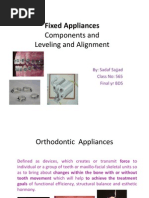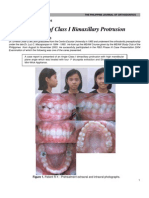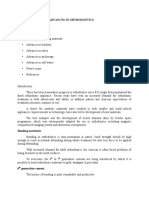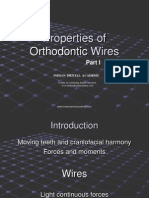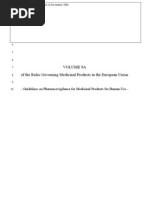0 ratings0% found this document useful (0 votes)
173 viewsModern Begg - / Orthodontic Courses by Indian Dental Academy
Modern Begg - / Orthodontic Courses by Indian Dental Academy
Uploaded by
indian dental academyThe Indian Dental Academy is the Leader in continuing dental education , training dentists in all aspects of dentistry and offering a wide range of dental certified courses in different formats.
Indian dental academy provides dental crown & Bridge,rotary endodontics,fixed orthodontics,
Dental implants courses. For details pls visit www.indiandentalacademy.com ,or call
0091-9248678078
Copyright:
© All Rights Reserved
Available Formats
Download as PPT, PDF, TXT or read online from Scribd
Modern Begg - / Orthodontic Courses by Indian Dental Academy
Modern Begg - / Orthodontic Courses by Indian Dental Academy
Uploaded by
indian dental academy0 ratings0% found this document useful (0 votes)
173 views54 pagesThe Indian Dental Academy is the Leader in continuing dental education , training dentists in all aspects of dentistry and offering a wide range of dental certified courses in different formats.
Indian dental academy provides dental crown & Bridge,rotary endodontics,fixed orthodontics,
Dental implants courses. For details pls visit www.indiandentalacademy.com ,or call
0091-9248678078
Original Title
Modern Begg – / orthodontic courses by Indian dental academy
Copyright
© © All Rights Reserved
Available Formats
PPT, PDF, TXT or read online from Scribd
Share this document
Did you find this document useful?
Is this content inappropriate?
The Indian Dental Academy is the Leader in continuing dental education , training dentists in all aspects of dentistry and offering a wide range of dental certified courses in different formats.
Indian dental academy provides dental crown & Bridge,rotary endodontics,fixed orthodontics,
Dental implants courses. For details pls visit www.indiandentalacademy.com ,or call
0091-9248678078
Copyright:
© All Rights Reserved
Available Formats
Download as PPT, PDF, TXT or read online from Scribd
Download as ppt, pdf, or txt
0 ratings0% found this document useful (0 votes)
173 views54 pagesModern Begg - / Orthodontic Courses by Indian Dental Academy
Modern Begg - / Orthodontic Courses by Indian Dental Academy
Uploaded by
indian dental academyThe Indian Dental Academy is the Leader in continuing dental education , training dentists in all aspects of dentistry and offering a wide range of dental certified courses in different formats.
Indian dental academy provides dental crown & Bridge,rotary endodontics,fixed orthodontics,
Dental implants courses. For details pls visit www.indiandentalacademy.com ,or call
0091-9248678078
Copyright:
© All Rights Reserved
Available Formats
Download as PPT, PDF, TXT or read online from Scribd
Download as ppt, pdf, or txt
You are on page 1of 54
Modern Begg
Beddtiot & CAT Techniques.
INDIAN DENTAL ACADEMY
Leader in continuing dental education
www.indiandentalacademy.com
www.indiandentalacademy.com
Introduction
Conventional Begg empirical and cook book
trt.
Begg operators
limitations
- need to diverge from orthodox trt.
Contemporary trt. goals & strategies incorporated
into Begg practice.
Modern Begg.
Refined Begg.
www.indiandentalacademy.com
Modern Begg.
Follows Begg principles large extent.
Brackets modified ( other than Ribbon arch
type used in conventional Begg)
www.indiandentalacademy.com
BEDDTIOT.
(Begg Edgewise Diagnosis Determined
Totally Individualised Orthodontic
Technique.)
Offers capacity to employ selected principles and
features of Begg and Edgewise mechanisms
specific situations most advantageous.
Primary Goal
Facility to treat each patients needs most
efficient for that individual.
www.indiandentalacademy.com
Strong points in Begg Technique:
Proficiency in bite opening.( with elastics )
Differential response to force.
pitting limited tipping x translation.
optimal ant. movement, anchorage conservation.
Edgewise appl.
Precise control.
Facilitates anch. Expenditure.
www.indiandentalacademy.com
Foundations:
Light wire.
Gentle, long range force systems
Min. bracket size max. interbracket span.
Light undersized wires.
www.indiandentalacademy.com
Differential response to force.
Simple horizontal force Tooth tip.
Crestal bone exp. 3x times more force than
apical bone.
Crestal region force sufficient rapid tooth
movement.
Apical region insufficient force.
www.indiandentalacademy.com
Less bone around the neck of the tooth
than apex.
strain near the alveolar crest.
Stress
in apical region.
Above factors
multiply each other.
powerful adv. very light simple tipping forces.
www.indiandentalacademy.com
www.indiandentalacademy.com
Retraction tipping + uprighting
Adv. anchorage conserved.
Effective translatory retraction greater
force greater anchorage loss.
Repositioning roots after tipping reaction
strain insufficient for anchor loss
www.indiandentalacademy.com
Modern orthodontic system concerned:
Interdental relationships.
Facial str. & appearance.
Orientation of the dentition in the face.
Oral function.
Best approach determined by diagnosis.
Appliance versatile.
www.indiandentalacademy.com
Brackets.
Dimensions:
Narrow, single width edgewise br.
( 0.050 inch or 1.3 mm).
Horizontal slot 0.022 ( height ) x 0.028
(faciolingual depth).
Vertical slot 0.020 x 0.020.
Archwire slots torqued.
.
www.indiandentalacademy.com
Torque values - 0, 5, 10, 15, 20.
All brackets identical - except for torque.
Torque indicator groove - gingival lingual root torque.
- occlusal lingual crown torque
www.indiandentalacademy.com
Brackets:
bonding preferred.
Prewelded flat/curved universal bonding pads.
Advantages:
Facially facing archwire slots engagement of
archwire easy.
Small dimensions
. lip & cheek irritation.
occlusal interference.
bonding enamel surface.
problems with gingival proximity & oral hygiene.
www.indiandentalacademy.com
Interbracket long resilient span
- archwire.
Wire less distortion.
Less elastic range requd. force.
Considerable ( limited ) tipping .
0.016 wires - 10 distal crown tipping.
0.018 wires - 5 mesial crown tipping
(uprighting)
braking not required.
Vertical slot
Uprighting springs
Turned 90 - miniature buccal tube.
www.indiandentalacademy.com
Uprighting springs.
Original Recent
Original.
Helix farther from archwire.
Hook arm no extra offset reqd.
Recent
More hygienic.
irritation on gingiva.
Appearance less conspicuous
www.indiandentalacademy.com
Buccal Tubes:
Dimensions:
4.5 mm long, 0.022 x 0.028 edgewise.
lingual crown torque, 25 lower.
10 - Upper.
Distal end of max. tube - 10 outward angulation.
( toe- in).
Headgear tube 0.051 occlusal & buccal.
www.indiandentalacademy.com
In cases with deep bite/ moderate
- severe anchorage req
Addnl. Rect. Tube diagonally across
buccal surface of basic tube
mesial end pointing gingivally.
Dimensions.
4.5mm long, 0.022 x 0.028.
Outer tube ( Addnl. Tube ) - 15
angulation to inner tube.
www.indiandentalacademy.com
Bite Opening:
Outer tubes main arch wire bite opening &
retraction phases.
Gingival angulation effective built in anchor
bends.( actual bend - - 25 ).
Inner tubes Rect. sectional wires lock PM &
Molar.
single large tooth C.R mesial than - C.R of Molar
www.indiandentalacademy.com
Bite opening more potent check elastics.
Intrusive force - -
less tendency to tip
anchor units distally.
www.indiandentalacademy.com
Rotations:
Early belief rotation control difficult.
Offset bracket side of tooth disp. lingually.
Overcorrection thickwalled elastomeric lig.-
placed on wire before insertion.
Bayonet bends.
www.indiandentalacademy.com
Torque control:
Disadv. Of larger slot 0.022 x 0.028 large wires
used precise control Rigid.
Overcome resilient rect. Wires ribbon mode.
Sizes used:
Square wires.
0.019
0.020
0.021
0.022
0.020 x 0.016
0.021 x 0.016
0.022 x 0.016
www.indiandentalacademy.com
Newer non steel alloy archwires
Extremely resilient gentle forces
Approp. size precise bracket engagement.
Esthetic & Hygienic. ( eliminate aux.)
Torqued brackets build trt. into the appl.
Facial root torque lower incisors augment
anchorage.
0.022 x 0.016 , 5 torque.
Limit tipping of upper incisors - palatal torque.
www.indiandentalacademy.com
Important adv. - BEDDTIOT
Facility for both 3 dimensional control
& simple bracket
Limited tipping light forces
Facilitate application of the best modality in every
situation.
www.indiandentalacademy.com
Combined Anchorage Technique
Variable Anchorage systems.
Design of the attachment
provides optimum light wire & straight wire trt.
capabilities.
Four stage light wire appliance successful
collaboration b/w Begg practitioners & Unitek
Beneficial design features adv. of Begg & St. wire.
www.indiandentalacademy.com
Advantages & Disadv. of the two tech.
Begg light wire appl.
Advantages:
Light optimum force ( 60 90 g )
Continuous force.
Min. friction.
Rapid alignment, leveling , rotation of ant. teeth.
Rapid overbite correction.
Simultaneous crown tipping.
Continuous paralleling of roots at extn. sites.
Continuous torquing.
Extra oral force unnecessary.
www.indiandentalacademy.com
Disadvantages.
Diff. co-ordinating max. & mand. arch
Diff. bilateral symmetry.
Premolar & molar torque control diff.
Diff. in stabilizing teeth final artistic
positioning.
www.indiandentalacademy.com
Straight wire appliance.
Advantages:
Precise control PM & M torque.
Bilateral symmetry BL inclinations readily
attained.
Bilateral symetry of arch form.
bends in archwires.
Finishing
Self limitation of movmt. & stabilization of
teeth- final detailing.
www.indiandentalacademy.com
Disadvantages.
force levels wider bracket, interbracket
span.
Rapid ant. alignment diff.
Overbite correction diff.
Addnl. anchorage necessary- friction.
Extra oral force reqd.
Alignment incisors & canines in sequence.
www.indiandentalacademy.com
Dynamic & Static anchorage.
Dynamic anchorage
It comprises physical
forces generated by the
appl. in a complex
interrelationship equally
effective forces biologic
environment.
Light wire
force sys.
Biologic
force sys.
Unipoint
contacts
Muscle action
Anchor bend Tooth morph &
mass.
Archwire Cuspal interlock.
Aux. wire Freeway & fnl.
Paths.
Tipping force Occl. Force &
migr.
Intr forces Bone density
Extrusive forces Growth
Rot. Forces Habits
www.indiandentalacademy.com
Static Anchorage.
Increasing the forces within the appl. Less
effect of the biologic force sys.
CAT dynamic & static anchorage resistance dev.
- applied certain stages trt. program.
Stage I & II Dynamic.
Stage III Dynamic / Static.
Stage IV Static.
www.indiandentalacademy.com
Four Stage Light wire Appliance:
Appl. vehicle transmitting force
teeth &indirectly bone & soft tissue.
Design of appl. Elements, positioning, adjustments
& manipulations imp. max. trt. efforts.
Caution:
Prudent to use conventional approach each trt.
stage as long as progress is good.
www.indiandentalacademy.com
Brackets.
Gingival or Ribbon arch slot free
tipping, no binding.
Edgewise slot precise final detailing.
Three bracket types optimal rotations,
tipping & torque.
Base beveled friction or binding with
archwire.
Torque, tip, in out sp. vary for each
tooth.
www.indiandentalacademy.com
Molar tube:
0.036 round tube gingivally.( Begg )
0.018 x 0.025 or 0.022 x 0.028.
Tubes - 7 offset addnl. molar control Stage II.
0.018 x 0.025 slot recommended.
Conventional tubes preferred to convertible tubes.
www.indiandentalacademy.com
Placement of brackets & tubes:
All teeth except 2
nd
molars receive attachment
as soon as practical: increase force control.
Mandibular 1
st
molar tubes placed first.
0.036 tube gingival margin.
rect. Tube middle third of crown.
edgewise tube 3.5 mm tip of buccal cusp of 1
st
molar.
3.5 mm std. for all brackets,
EXCEPT, Canines & upper LI br.
canine br. 0.5 mm gingivally,
LI br - 0.5 mm incisally.
www.indiandentalacademy.com
Treatment technique:
Trt. divided into 4 stages.
Stage I - Organization.
Overbite correction.
Cl. II or Cl. III correction.
Alignment, levelling, elimination of rotations-
incisors.
Correction of crossbite & archwidth problems.
Overcorrection
www.indiandentalacademy.com
Stage II. Consolidation.
Closure of remaining spaces.
Retraction of incisors.
Maintenance of overbite, rotations, antero-post.
corrections.
Overcorrection.
Stage III. Correction of crown & root inclination.
Uprighting & paralleling of roots.
Torquing of ant. teeth.
Maintenance of corrections.
www.indiandentalacademy.com
Stage IV. Final detailing.
Attainment ideal arch form & co-ordination of
archwidth.
Attainment desired torque.
Precise intercuspation & fnl. harmony.
Optimal facial & dental esthetics.
Commencement of retention.
www.indiandentalacademy.com
Stage I.
Archwires:
Initiated 0.016 round wires Begg slot.
Cl II elastic force lingual rolling lower molar.
Mild exp. reqd.
45 anchor bend 1-2 mm mesial molar tube.
In severe crowding
Multiloop deep bite/ max. anchorage cases.
Niti shallow bites / min. anchorage req.
www.indiandentalacademy.com
Anchor bends-
Intrusive + labial movement.
Extrudes & tips molars distally.
Class II elastic force:
Combination of intrusive + retractive forces
Center of rotn.- more apical max. lingual
crown tipping.
Elastics:
Very light elastic forces.
2 -3 oz. 24 hrs a day.
www.indiandentalacademy.com
Stage II.
End of stage I occl. organized appearance.
St. II begins consolidation of the dentition.
Goals in Stage I not reduced.
Elastics:
Intrarch elastics max. ant. retrcn. &
gen. space consolidation. 2-3 oz.
Six elastics used.
Elastics eliminated space closed.
Arch wire bent distal to molar tube.
www.indiandentalacademy.com
Archwire:
0.018 round wire.
25 anchorage bend, 5 toe in bend.
Toe in bend counter act rotational moment
inter arch elastics.
www.indiandentalacademy.com
Stage III.
Crown & root coordination/ torquing & paralleling
stage.
All spaces closed.
Crown tipping may be considerable.
All corrections maintained.
Molars & canine Class I reln.
post. occlsn. inter locked min. anchor loss-
subsequent torquing & uprighting.
www.indiandentalacademy.com
Pre stage III reqd. occasionally.
Reevaluation of br. ht & posn. recommended.
Archwires:
Maxillary:
0.020 dia.
Constr. To Omega shape.
Anchor bend 0 - 5.
Inset bend into molar tube.
Vertical bend premolar slot.
V bend distal to canines.
Cinched .
Overcorrected.
www.indiandentalacademy.com
Mandibular:
0.018 or 0.020 dia.
Exp. bilaterally.
Inset bend molar tube.
Vertical bend into premolar.
V bend distal to canines.
Anchor bend of 5 - 10.
Cinched.
Overcorrected.
www.indiandentalacademy.com
Auxiliaries:
Uprighting springs.
Two forms.
Safety ligature hold tooth archwire.
Safety lock spring safety extension holds
wire in gingival slot.
Wire size used 0.014 or 0.016.
Torquing Aux.
0.016 wire four spur/ two spur.
www.indiandentalacademy.com
Stage III complicated.
Constant monitoring reqd.
In CAT absolute determination final uprighting,
B-L placement, torque not reqd.
Straight wire slot final artistic finishing - teeth.
www.indiandentalacademy.com
Stage IV.
Trt. done in edgewise slot.
Preangulated,pretorqued, in out
features
precise crown & root posn.
Stage IV not a substitute Stage III
Begg.
Excellent bite opening.
Enmasse retrcn. of incisors Stage I
& II.
Rapid uprighting canine & PM roots.
Torque of incisors Stage III.
All these adv. to be used to greatest extent
Begg mech.
www.indiandentalacademy.com
Stage IV:
Primarily to increase effectiveness & precision- final
detailing.
hygiene problems auxiliary springs.
Lingual crown torque of post. teeth.
Establish bilateral symmetry uprighting.
Achieve proper paralleling & torque.
Coordinate arch form & width.
Second molars:
More optimal occlusal reln.
To obtain best arch form.
Coordinate crown & root torque of post. teeth.
www.indiandentalacademy.com
To get levelling - two preliminary round wires
0.016 or 0.018 Nitinol wire.
Edge wise slot mech. alignment adequate.
Wires used.
0.017 x 0.025 NiTi.
0.016 x 0.022 , 0,018 x 0.025 SS.
Max. torque benefit 0.018 x 0.025 ss.
Post. teeth good axial incl.
reduce force levels 0.018 round .
www.indiandentalacademy.com
Final Detailing.
Adjustments / modifications archwires -
Discrepancies size, symmetry, fn. of teeth.
Repositioning br. / 1
st
order or 2
nd
order bends.
Settling 0.014 wire + vertical elastics.
Finishing & Retention:
Bonded canine to canine lower.
Hawleys Appliance Upper.
www.indiandentalacademy.com
Advantages of CAT.
Enhances trt. potentials.
Accumulates trt. advantages.
Reduces response time.
Enhances muscular effects.
Simplifies co-operation.
Variable anchorage effects.
Reduced energy losses.
Diversity of three slots.
Controlled tipping & translation.
Goal oriented trt.
Establishes positive profile control
www.indiandentalacademy.com
Conclusion.
CAT system is a biomechanical approach to
treatment which enables the clinician to vary the
treatment technique, vary the type of movements
and vary the resistance anchorage to simplify
co-operation and to definitely expand the
opportunity to overcome problems and enhance
success of trt.
www.indiandentalacademy.com
Thank you
For more details please visit
www.indiandentalacademy.com
www.indiandentalacademy.com
You might also like
- Terminologia HistologicaDocument2 pagesTerminologia HistologicaLute CastroNo ratings yet
- Fixed Orthodontic Appliances: A Practical GuideFrom EverandFixed Orthodontic Appliances: A Practical GuideRating: 1 out of 5 stars1/5 (1)
- Begg1977 PDFDocument39 pagesBegg1977 PDFKhyati GuptaNo ratings yet
- Guyton Physiology Chapter 9 OutlineDocument18 pagesGuyton Physiology Chapter 9 Outlinebahahahah100% (5)
- Fixed AppliancesDocument60 pagesFixed AppliancesMohsin Habib100% (1)
- MAA Final / Orthodontic Courses by Indian Dental AcademyDocument93 pagesMAA Final / Orthodontic Courses by Indian Dental Academyindian dental academyNo ratings yet
- Biomechanics in Orthodontics - A Review (Part 1) IJODODocument11 pagesBiomechanics in Orthodontics - A Review (Part 1) IJODOPranshu MathurNo ratings yet
- Tads 1Document6 pagesTads 1travolta0No ratings yet
- Ortho Lab 1Document11 pagesOrtho Lab 1nightfury200313No ratings yet
- Friction Ortho .KaajalllDocument42 pagesFriction Ortho .Kaajallldangi.ishu29No ratings yet
- Third Stage Begg MechanotherapyDocument32 pagesThird Stage Begg MechanotherapyNaziya ShaikNo ratings yet
- 7Document6 pages7Sungo GridsawanNo ratings yet
- Myth in OrthoDocument7 pagesMyth in Orthosurendra334No ratings yet
- Edgewise Appliance Straightwire Appliance Esthetic AppliancesDocument5 pagesEdgewise Appliance Straightwire Appliance Esthetic Appliancesplazari07No ratings yet
- ISSN 2347-5579: 0.018" Versus 0.022" Bracket Slot Systems in Orthodontics: A ReviewDocument4 pagesISSN 2347-5579: 0.018" Versus 0.022" Bracket Slot Systems in Orthodontics: A ReviewRahulLife's100% (1)
- Impacted Maxillary Canines-A Review. - American Journal of Orthodontics and Dentofacial Orthopedics, 101-159, 1992 PDFDocument13 pagesImpacted Maxillary Canines-A Review. - American Journal of Orthodontics and Dentofacial Orthopedics, 101-159, 1992 PDFPia ContrerasNo ratings yet
- Removable AppliancesDocument30 pagesRemovable Appliancessamar yousif mohamedNo ratings yet
- Fixed Functional AppliancesDocument82 pagesFixed Functional Appliancesdisha 146jandialNo ratings yet
- Esthetic - Considerations - in - Orthodontics - An - Overview SECOND YEAR JC (FIRST)Document6 pagesEsthetic - Considerations - in - Orthodontics - An - Overview SECOND YEAR JC (FIRST)VEENA k.aNo ratings yet
- Medical Disorder Considerations in Orthodontic Patients NDocument115 pagesMedical Disorder Considerations in Orthodontic Patients Nshubhangi_jain_10No ratings yet
- Torque in Various Appliance SystemDocument120 pagesTorque in Various Appliance Systempuneeth gowdaNo ratings yet
- Nisu BeggDocument97 pagesNisu BeggkishanNo ratings yet
- Space: MaintainersDocument48 pagesSpace: MaintainersAdrin CreationsNo ratings yet
- Article Text AlexanderDocument6 pagesArticle Text AlexandervictorNo ratings yet
- Nickel Titanium Alloys / Orthodontic Courses by Indian Dental AcademyDocument182 pagesNickel Titanium Alloys / Orthodontic Courses by Indian Dental Academyindian dental academyNo ratings yet
- Temporary Anchorage Devices in Orthodontics: A Paradigm ShiftDocument7 pagesTemporary Anchorage Devices in Orthodontics: A Paradigm ShiftsmritiNo ratings yet
- Tip - EdgeDocument37 pagesTip - EdgearshabharataNo ratings yet
- Ashok Sir Arch WireDocument130 pagesAshok Sir Arch WireDeepuUrs100% (1)
- DriftodonticsDocument2 pagesDriftodonticssweetieNo ratings yet
- 012-257 Segner PDFDocument4 pages012-257 Segner PDFdrzana78No ratings yet
- ClaspsDocument9 pagesClaspsdrkameshNo ratings yet
- Lingual Orthodontics / Orthodontic Courses by Indian Dental AcademyDocument172 pagesLingual Orthodontics / Orthodontic Courses by Indian Dental Academyindian dental academyNo ratings yet
- SplintingDocument94 pagesSplintingsanthoshi_rani2006100% (3)
- The Damon System - Simplifi Ed Mechanics: Written by Dr. Alan Bagden, D.M.DDocument8 pagesThe Damon System - Simplifi Ed Mechanics: Written by Dr. Alan Bagden, D.M.DHARITHA H.PNo ratings yet
- A Lingual Arch For Intruding and Uprighting Lower Incisors: Winston Senior, LDS, RCS, Ddo, RfpsDocument6 pagesA Lingual Arch For Intruding and Uprighting Lower Incisors: Winston Senior, LDS, RCS, Ddo, RfpsrohitNo ratings yet
- Ret and RelapseDocument78 pagesRet and RelapseDeepshikha MandalNo ratings yet
- Standard Edgewise Technique: Contributors: Dr. Puneet Batra Dr. Anu Singla Dr. Amit SrivastavaDocument45 pagesStandard Edgewise Technique: Contributors: Dr. Puneet Batra Dr. Anu Singla Dr. Amit SrivastavaAgia Tessa AndrianiNo ratings yet
- Open Bite - Spectrum of Treatment Potentials and LimitationsDocument20 pagesOpen Bite - Spectrum of Treatment Potentials and LimitationsDr.Thrivikhraman KothandaramanNo ratings yet
- Ortho Case ReportDocument6 pagesOrtho Case ReportAlex Adille OgaoNo ratings yet
- Biographical Account of DR - Angel - Ortho / Orthodontic Courses by Indian Dental AcademyDocument74 pagesBiographical Account of DR - Angel - Ortho / Orthodontic Courses by Indian Dental Academyindian dental academy100% (1)
- Recent Advancements in Orthodontic Brack PDFDocument7 pagesRecent Advancements in Orthodontic Brack PDFAthira JithendranathNo ratings yet
- Fixed ApplainceDocument2 pagesFixed ApplainceSaravanan KanagavelNo ratings yet
- Comparative Evaluation of Intrusive Effects of Miniscrew, Connecticut Intrusion Arch, and Utility Intrusion Arch - An in Vivo StudyDocument8 pagesComparative Evaluation of Intrusive Effects of Miniscrew, Connecticut Intrusion Arch, and Utility Intrusion Arch - An in Vivo StudyMeguja jithinNo ratings yet
- A Review On Double Keyhole LoopDocument4 pagesA Review On Double Keyhole LoopAthira JithendranathNo ratings yet
- Management of Class II MalocclusionDocument79 pagesManagement of Class II MalocclusionmadhuvanthiNo ratings yet
- Orthodontic Bonding A Direct ApproachDocument9 pagesOrthodontic Bonding A Direct ApproachAniket PotnisNo ratings yet
- HEADGEARDocument10 pagesHEADGEARAninditaNo ratings yet
- Managing Class 3 Malocclusions: C H A P T e RDocument22 pagesManaging Class 3 Malocclusions: C H A P T e RjohnmaxNo ratings yet
- 2 Planning Anchorage 1Document25 pages2 Planning Anchorage 1frmeskNo ratings yet
- Effects of Class II Elastics During Growth On The Functional Occlusal Plane According To Skeletal Pattern and Extraction Vs NonextractionDocument7 pagesEffects of Class II Elastics During Growth On The Functional Occlusal Plane According To Skeletal Pattern and Extraction Vs NonextractionAlejandra NietoNo ratings yet
- Functional Occlusion and OrthodonDocument9 pagesFunctional Occlusion and OrthodonAlberto DeodatoNo ratings yet
- Evaluation of The Clinical Effectiveness of Churro Jumper - JIOS 2013 (Full Permission)Document7 pagesEvaluation of The Clinical Effectiveness of Churro Jumper - JIOS 2013 (Full Permission)drgeorgejose7818No ratings yet
- Extraoral Orthopaedic AppliancesDocument59 pagesExtraoral Orthopaedic AppliancesAmatullahsadiyaNo ratings yet
- Fixed Functional Appliances - A ClassificationDocument31 pagesFixed Functional Appliances - A Classificationdrimtiyaz123100% (1)
- Friction in OrthodonticDocument1 pageFriction in OrthodonticLucas Hernández PérezNo ratings yet
- Cephalometric Analysis Manual Tracing of A LateralDocument5 pagesCephalometric Analysis Manual Tracing of A Lateralmoh.ahm3040No ratings yet
- Evaluation of Continuous Arch and Segmented Arch Leveling Techniques in Adult Patients-A Clinical Study PDFDocument6 pagesEvaluation of Continuous Arch and Segmented Arch Leveling Techniques in Adult Patients-A Clinical Study PDFDiana Paola FontechaNo ratings yet
- Recent Advances in Orthodontics: TH THDocument14 pagesRecent Advances in Orthodontics: TH THVijay Chintha100% (1)
- Burstone's Biomechanical Foundation of Clinical Orthodontics: Second EditionFrom EverandBurstone's Biomechanical Foundation of Clinical Orthodontics: Second EditionNo ratings yet
- Minimally Invasive Periodontal Therapy: Clinical Techniques and Visualization TechnologyFrom EverandMinimally Invasive Periodontal Therapy: Clinical Techniques and Visualization TechnologyNo ratings yet
- The Roth Prescription / Orthodontic Courses by Indian Dental AcademyDocument85 pagesThe Roth Prescription / Orthodontic Courses by Indian Dental Academyindian dental academy100% (3)
- Study Model / Orthodontic Courses by Indian Dental AcademyDocument134 pagesStudy Model / Orthodontic Courses by Indian Dental Academyindian dental academy83% (6)
- Sterilization of Ortho Instruments / Orthodontic Courses by Indian Dental AcademyDocument57 pagesSterilization of Ortho Instruments / Orthodontic Courses by Indian Dental Academyindian dental academyNo ratings yet
- Vit and Hormone in Relation To Growth and Development / Orthodontic Courses by Indian Dental AcademyDocument38 pagesVit and Hormone in Relation To Growth and Development / Orthodontic Courses by Indian Dental Academyindian dental academyNo ratings yet
- Rapid Molar Intrusion Device / Orthodontic Courses by Indian Dental AcademyDocument55 pagesRapid Molar Intrusion Device / Orthodontic Courses by Indian Dental Academyindian dental academyNo ratings yet
- Soft Tissus Ceph Analysis / Orthodontic Courses by Indian Dental AcademyDocument155 pagesSoft Tissus Ceph Analysis / Orthodontic Courses by Indian Dental Academyindian dental academy100% (1)
- Ss Wire Properties / Orthodontic Courses by Indian Dental AcademyDocument79 pagesSs Wire Properties / Orthodontic Courses by Indian Dental Academyindian dental academyNo ratings yet
- Root Movement in Orthodontics / Orthodontic Courses by Indian Dental AcademyDocument93 pagesRoot Movement in Orthodontics / Orthodontic Courses by Indian Dental Academyindian dental academy86% (7)
- Periodontal Changes in Ortho Treatment / Orthodontic Courses by Indian Dental AcademyDocument81 pagesPeriodontal Changes in Ortho Treatment / Orthodontic Courses by Indian Dental Academyindian dental academyNo ratings yet
- Space Closure3 / Orthodontic Courses by Indian Dental AcademyDocument51 pagesSpace Closure3 / Orthodontic Courses by Indian Dental Academyindian dental academy100% (5)
- Saliva / Orthodontic Courses by Indian Dental AcademyDocument191 pagesSaliva / Orthodontic Courses by Indian Dental Academyindian dental academyNo ratings yet
- Pre-Natal and Post-Natal Development of Maxilla Part 4 / Orthodontic Courses by Indian Dental AcademyDocument76 pagesPre-Natal and Post-Natal Development of Maxilla Part 4 / Orthodontic Courses by Indian Dental Academyindian dental academyNo ratings yet
- Roth's Prescription / Orthodontic Courses by Indian Dental AcademyDocument64 pagesRoth's Prescription / Orthodontic Courses by Indian Dental Academyindian dental academy100% (1)
- Radiology in Orthodontics-Dr - Kavitha / Orthodontic Courses by Indian Dental AcademyDocument85 pagesRadiology in Orthodontics-Dr - Kavitha / Orthodontic Courses by Indian Dental Academyindian dental academyNo ratings yet
- Pre-Natal and Post-Natal Development of Maxilla Part 2 / Orthodontic Courses by Indian Dental AcademyDocument72 pagesPre-Natal and Post-Natal Development of Maxilla Part 2 / Orthodontic Courses by Indian Dental Academyindian dental academyNo ratings yet
- Role of Drugs in Orthodontics / Orthodontic Courses by Indian Dental AcademyDocument239 pagesRole of Drugs in Orthodontics / Orthodontic Courses by Indian Dental Academyindian dental academyNo ratings yet
- Orthodontic Brackets / Orthodontic Courses by Indian Dental AcademyDocument102 pagesOrthodontic Brackets / Orthodontic Courses by Indian Dental Academyindian dental academyNo ratings yet
- Molecular Basis PART 1 / Orthodontic Courses by Indian Dental AcademyDocument188 pagesMolecular Basis PART 1 / Orthodontic Courses by Indian Dental Academyindian dental academyNo ratings yet
- Orthodontic Wires - Properties / Orthodontic Courses by Indian Dental AcademyDocument226 pagesOrthodontic Wires - Properties / Orthodontic Courses by Indian Dental Academyindian dental academy100% (1)
- Methods of Gaining Space. / Orthodontic Courses by Indian Dental AcademyDocument70 pagesMethods of Gaining Space. / Orthodontic Courses by Indian Dental Academyindian dental academy100% (2)
- Orthodontic Adhesives / Orthodontic Courses by Indian Dental AcademyDocument137 pagesOrthodontic Adhesives / Orthodontic Courses by Indian Dental Academyindian dental academy100% (1)
- Obstructive Sleep Apnea - Dr.M.M.varadharaja / Orthodontic Courses by Indian Dental AcademyDocument168 pagesObstructive Sleep Apnea - Dr.M.M.varadharaja / Orthodontic Courses by Indian Dental Academyindian dental academy100% (1)
- Interceptive Orthodontics 1 / Orthodontic Courses by Indian Dental AcademyDocument44 pagesInterceptive Orthodontics 1 / Orthodontic Courses by Indian Dental Academyindian dental academyNo ratings yet
- Implants and Anchorage / Orthodontic Courses by Indian Dental AcademyDocument52 pagesImplants and Anchorage / Orthodontic Courses by Indian Dental Academyindian dental academy100% (1)
- Mandibular Growth Rotation (2) / Orthodontic Courses by Indian Dental AcademyDocument28 pagesMandibular Growth Rotation (2) / Orthodontic Courses by Indian Dental Academyindian dental academyNo ratings yet
- Lasers and Its Role in Endodontics / Orthodontic Courses by Indian Dental AcademyDocument73 pagesLasers and Its Role in Endodontics / Orthodontic Courses by Indian Dental Academyindian dental academyNo ratings yet
- Materials in Orthodontics / Orthodontic Courses by Indian Dental AcademyDocument124 pagesMaterials in Orthodontics / Orthodontic Courses by Indian Dental Academyindian dental academy100% (2)
- Indices / Orthodontic Courses by Indian Dental AcademyDocument77 pagesIndices / Orthodontic Courses by Indian Dental Academyindian dental academyNo ratings yet
- Hybrid Functional Appliance / Orthodontic Courses by Indian Dental AcademyDocument127 pagesHybrid Functional Appliance / Orthodontic Courses by Indian Dental Academyindian dental academy100% (2)
- Transverse Myelitis and Vaccines - A Multi-AnalysisDocument8 pagesTransverse Myelitis and Vaccines - A Multi-AnalysisKaloy KamaoNo ratings yet
- What Is A Fever?: Christian L. Magpantay Bsed Iii MapehDocument6 pagesWhat Is A Fever?: Christian L. Magpantay Bsed Iii Mapehchano magpantayNo ratings yet
- Pengantar Herbal Medicine Prof M Aris Widodo PPD UnismaDocument25 pagesPengantar Herbal Medicine Prof M Aris Widodo PPD UnismaAhmad KusayiriNo ratings yet
- PromethazineDocument3 pagesPromethazineGwyn RosalesNo ratings yet
- Lec 06.B. Starting Position - Pelvic TiltDocument23 pagesLec 06.B. Starting Position - Pelvic TiltpashaNo ratings yet
- Ectopic Pregnancy Drug Study (Vizcodne, Ehreiz Raiden C. BSN2-A)Document23 pagesEctopic Pregnancy Drug Study (Vizcodne, Ehreiz Raiden C. BSN2-A)Raiden VizcondeNo ratings yet
- IOM RegistrationDocument1 pageIOM Registrationcrystalworld2222No ratings yet
- (2017) BELOUSOVA, Irena E. Mycosis Fungoides Manifesting As Giant Cell Lichenoid DermatitisDocument3 pages(2017) BELOUSOVA, Irena E. Mycosis Fungoides Manifesting As Giant Cell Lichenoid DermatitisCassandra VérasNo ratings yet
- Pemfigoid GestationisDocument5 pagesPemfigoid Gestationissri karuniaNo ratings yet
- Magnesium Chloride in Acute and Chronic DiseasesDocument23 pagesMagnesium Chloride in Acute and Chronic DiseasesAhmetNo ratings yet
- Lab 04-Cardiovascular PhysiologyDocument18 pagesLab 04-Cardiovascular PhysiologyJude EdubaNo ratings yet
- APA Quiz 19oct11 PDFDocument8 pagesAPA Quiz 19oct11 PDFAlaa Yasin100% (1)
- PBL BurnDocument20 pagesPBL Burn徐浩恩No ratings yet
- Mental Health For Adolescence An Issue BriefDocument14 pagesMental Health For Adolescence An Issue Briefapi-405095582No ratings yet
- Volume Controlled VentilationDocument7 pagesVolume Controlled VentilationVijay GadagiNo ratings yet
- Department of Laboratory Medicine: Haematology Test Result Unit Biological Reference Interval Complete Blood Count (CBC)Document3 pagesDepartment of Laboratory Medicine: Haematology Test Result Unit Biological Reference Interval Complete Blood Count (CBC)abhilash eNo ratings yet
- PDF Hospital Training Report CompressDocument19 pagesPDF Hospital Training Report CompressAdnan RAHATNo ratings yet
- Design of A Receptionists' Table by Applying Ergonomic PrincipleDocument12 pagesDesign of A Receptionists' Table by Applying Ergonomic PrincipleKhaled Hossain MasumNo ratings yet
- SurgeryDocument9 pagesSurgeryMitkoNo ratings yet
- BrimonidineDocument8 pagesBrimonidinefiras qasimNo ratings yet
- Draft of Volume 9a 12 2005 enDocument198 pagesDraft of Volume 9a 12 2005 englobalpharmatek100% (1)
- Pharma Computation Assignment PDFDocument2 pagesPharma Computation Assignment PDFKasnhaNo ratings yet
- Woman's Own - 08 June 2020Document66 pagesWoman's Own - 08 June 2020XANPHOXYL KIBETNo ratings yet
- Students: Kubelac Milan Paul Laslo Maria Amelia Lazar Gheorghe Lese Ioana General Medicine II, 3rd Series, Group 15Document30 pagesStudents: Kubelac Milan Paul Laslo Maria Amelia Lazar Gheorghe Lese Ioana General Medicine II, 3rd Series, Group 15Ioana LeseNo ratings yet
- Superfood Septembar 2019Document5 pagesSuperfood Septembar 2019Vladimir JovanovicNo ratings yet
- Introduction Sports MassageDocument6 pagesIntroduction Sports MassageHari SetiawanNo ratings yet
- Board of Intermediate Education: Andhra Pradesh: Hyderabad From ToDocument2 pagesBoard of Intermediate Education: Andhra Pradesh: Hyderabad From ToVivek NnrrNo ratings yet
- New Commercial Acceptability of Fresh MilkDocument33 pagesNew Commercial Acceptability of Fresh MilkEdward Kenneth DragasNo ratings yet





